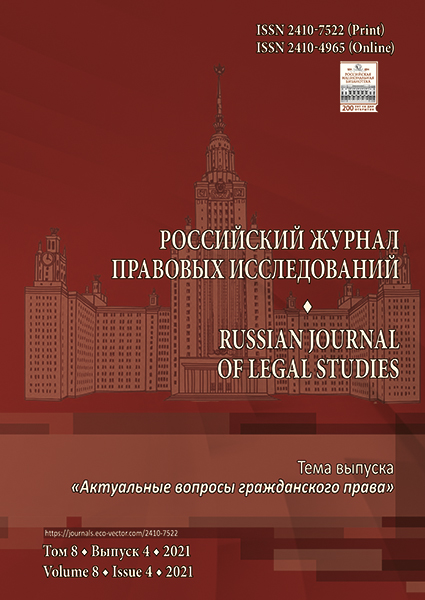Концептуальные подходы к нормативно-правовому регулированию геномных исследований и их использования в Российской Федерации
- Авторы: Никитина Е.Е.1, Помазанский А.Е.1
-
Учреждения:
- Институт законодательства и сравнительного правоведения при правительстве Российской Федерации
- Выпуск: Том 8, № 4 (2021)
- Страницы: 63-72
- Раздел: Конституционное право
- Статья получена: 03.12.2021
- Статья одобрена: 06.12.2021
- Статья опубликована: 18.01.2022
- URL: https://journals.eco-vector.com/2410-7522/article/view/89684
- DOI: https://doi.org/10.17816/RJLS89684
- ID: 89684
Цитировать
Полный текст
Аннотация
Статья посвящена проблеме законодательного регулирования общественных отношений, связанных с геномными исследованиями и использованием созданных на их основе геномных технологий в Российской Федерации. Развитие геномных технологий порождает множество этических, социальных и культурных проблем для российского общества и несет существенные риски для реализации прав и свобод человека, угрозы сохранения человеческой природы не только для существующих, но и для будущих поколений российских граждан. Для защиты указанных ценностей необходимо формирование системы нормативных правовых актов, регулирующих геномные исследования и геномные технологии в Российской Федерации.
Система регулирования в рассматриваемой сфере должна базироваться на трех уровнях: международном, национальном и на уровне профессионального сообщества. В статье делается вывод об отсутствии принципиальных противоречий в подходах международно-правовых актов и российского законодательства в области защиты прав человека при геномных исследованиях, что позволяет присоединиться к Конвенции о защите прав и достоинства человека в связи с применением достижений биологии и медицины 1997 г.
В статье анализируется действующая система законодательного регулирования соответствующих отношений на уровне федерального законодательства и даются прогнозные оценки ее дальнейшего развития. По мнению авторов, можно рассматривать две основные модели развития законодательства в данной области в России: «традиционная» модель, развивающаяся на основе количественного увеличения норм в различных отраслевых нормативных актах, и «комплексная», базирующаяся на едином комплексном акте, в котором устанавливаются задачи, принципы и общие подходы к регулированию отдельных институтов, связанных с геномными исследованиями и их использованием. В статье исследуются позитивные и негативные последствия принятия той или иной модели для развития геномики в Российской Федерации.
Полный текст
Об авторах
Елена Евгеньевна Никитина
Институт законодательства и сравнительного правоведения при правительстве Российской Федерации
Email: const@izak.ru
кандидат юридических наук
Россия, МоскваАндрей Евгеньевич Помазанский
Институт законодательства и сравнительного правоведения при правительстве Российской Федерации
Автор, ответственный за переписку.
Email: const@izak.ru
кандидат юридических наук
Россия, МоскваСписок литературы
- Лапаева В.В. Концепция совершенствования российского законодательства, регулирующего развитие исследований в области генома человека // Труды Института государства и права РАН. 2020. Т. 15. № 2. С. 111–134.
- Лановский М.Ф. Идентичность человека в мире современных биотехнологий. Автореф. дис. … к.ф.н. М., 2018. 34 с.
- Пржиленский В.И. Правовое регулирование геномных исследований в России и зарубежных странах // Вестник Университета им. О.Е. Кутафина. 2019. № 4. С. 119–126.
- Юдин С.М., Егорова А.М., Макаров В.В. Анализ микробиоты человека. Российский и зарубежный опыт // Международный журнал прикладных и фундаментальных исследований. 2018. № 11. С. 175–180.
- Юдин Б.Г. Биоэтические документы Совета Европы и российское законодательство // Медицинское право. 2003. № 3. С. 13-15.
- Шинкарецкая Г.Г., Редникова Т.В. Влияние политики международных организаций относительно исследований генома человека на развитие законодательства зарубежных стран // Международное право. 2019. № 4. С. 27–34.
- Тарасьянц Е.В. К вопросу о присоединении России к Конвенции о правах человека и биомедицине // Московский журнал международного права. 2011. № 2. С. 65–77.
- Блинов А.Г. Правовая среда проведения геномных исследований и перспективы ее оптимизации в России // Вестник Омского университета. Серия «Право». 2018. № 4. С. 139–144.
- Sartor G. Human Rights and Information Technologies // The Oxford Handbook of Law, Regulation and Technology / Ed. by R. Brownsword, E. Scotford, K. Yeung. New York, 2017. P. 424–450.
- Рассолов И.М., Чубукова С.Г., Микурова И.В. Анализ возможного применения к регулированию отношений по поводу генетической информации институтов персональных данных, личной тайны, врачебной тайны // Lex russica (Русский закон). 2020. Т. 73. № 4 (161). С. 143–151.
- Супрун Я.И., Козлова А.М. Практические и теоретические проблемы правового регулирования суррогатного материнства // Политика и Общество. 2021. № 1. С. 1–12.
- Локшин В.Н., Козлова В.Н., Нигматова Н.П. Современные методы предотвращения передачи мутаций митохондриальной ДНК в рамках вспомогательных репродуктивных технологий // Проблемы репродукции. 2015. Т. 21. № 6. С. 69–76.
- Проблемы определения пределов государственного вмешательства в сферу организации и проведения геномных исследований с учетом практических и функциональных значений саморегулирования со стороны профессионального сообщества / М.В. Варлен, К.В. Машкова, С.С. Зенин и др. // Государственная власть и местное самоуправление. 2019. № 8. С. 56–64.
Дополнительные файлы








